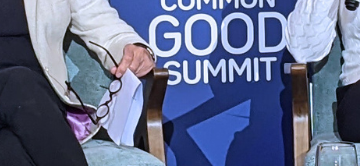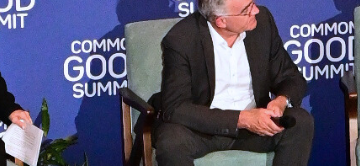This debate took place during the third edition of the Common Good Summit, organized jointly by TSE, Challenges and Les Echos-Le Parisien Evénements. On June 1 and 2, 2023, economists, economic decision-makers, representatives of public authorities and civil society came together to reflect on a central question: how can we save the common good? With over 1,300 participants and rich exchanges, this third edition confirms the importance of discussing tomorrow's issues together, from climate, mobility, food and inflation to health and artificial intelligence.
How can we get around with less pollution? How can we meet the needs of the population while taking ecological issues into account? Tomorrow's mobility poses many challenges.
At the 2023 Common Good Summit, Estelle Malavolti, economist at TSE and researcher at ENAC, spoke about the challenges facing tomorrow's mobility. "In recent years, numerous studies have shown a number of things about individual transport behavior. They raise an important issue: how to convince consumers to use alternative modes of transport over their own vehicle."
In particular, she quotes an Insee survey published in 2021, which reported that 42% of drivers use their car to make a journey of less than a kilometer. "It's appalling," she says, "and that's what we need to change. This can be done on several levels, in particular by reflecting on the relationship and value of time that consumers have via transport."
According to the economist, we need to rethink our relationship with time. "In economic modelling, transport is always seen as a cost that we try to reduce. What if, instead, we tried to optimize it?"
Using what already exists
Optimization is the watchword of the Rallumons l'Etoile association. This Toulouse-based organization brings together citizens, local elected representatives and trade union and business organizations. Its president, Benoît Lanusse, reminded the audience that many of the 1.3 million inhabitants of the Toulouse conurbation have no alternative to the private car. "Rallumons l'Etoile has identified the need for agglomeration trains that can offer an alternative to the car between the metro, which serves the heart of the metropolis very well, and the TER, which connects the rest of the territory."
"Our association is campaigning to be both ambitious and pragmatic, starting by optimizing what already exists," adds the chairman. He explains that the aim is to get a Toulouse RER (high-speed train service linking Toulouse to the suburb) up and running by 2029, with trains every 30 minutes from 5 a.m. to midnight, an integrated fare structure, a coordinated bus network and facilities to ensure continuity between trains, buses and bicycles.
Benoît Lanusse insists on the need for a joint project, for everyone to get out of their own lane and work together. According to Estelle Malavolti, this is also essential to ensure that projects voted through by public authorities are in line with the needs of the population. "There is often a lack of coordination and feedback when it comes to decision-making," notes the economist. In her view, this raises the question of the democratic process and the way in which civil society is involved in the implementation of these often-costly investments.
- Extracts from Challenges
- More information on Estelle Malavolti





